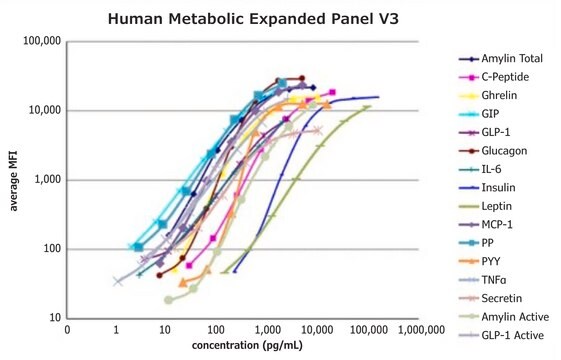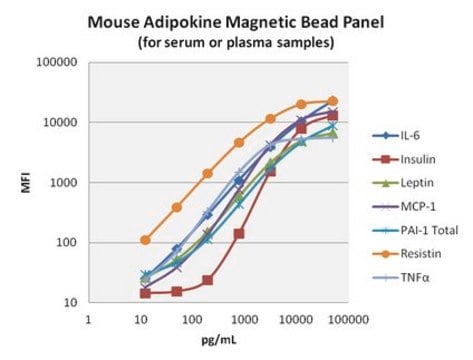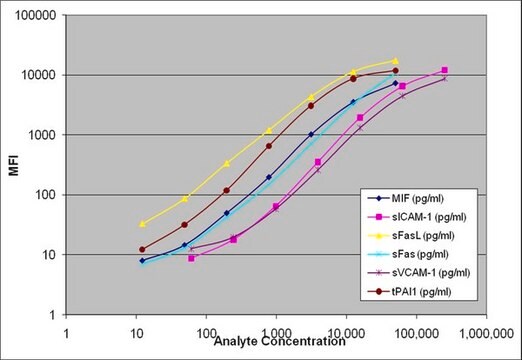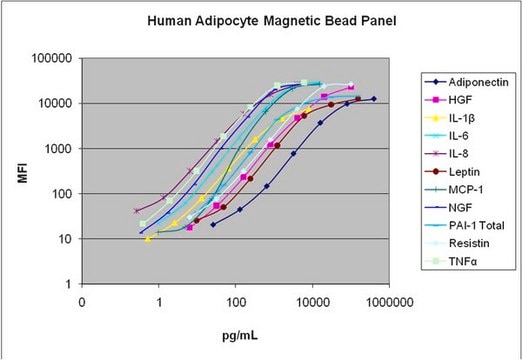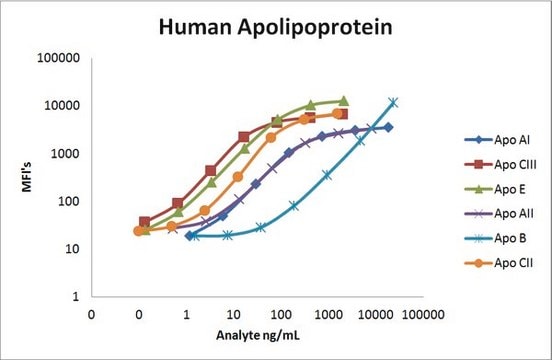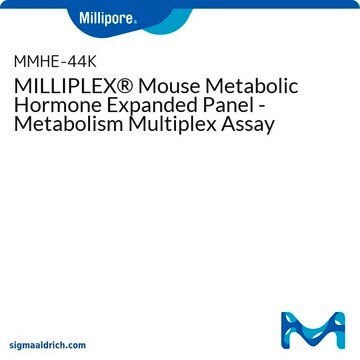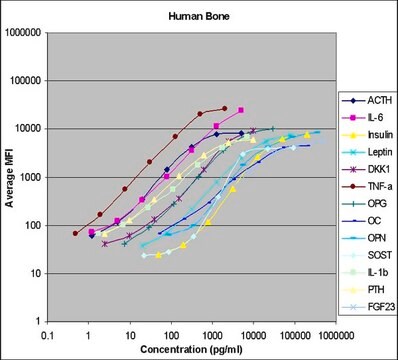HADK1MAG-61K
MILLIPLEX® Human Adipokine Magnetic Bead Panel 1 - Endocrine Multiplex Assay
The Human Adipokine Panel 1, using the Luminex xMAP technology, enables the simultaneous analysis of five biomarkers in human serum or plasma samples.
About This Item
Recommended Products
description
Quality Level
species reactivity
human
manufacturer/tradename
Milliplex®
assay range
accuracy: 87%
(Resistin)
accuracy: 89%
(Adiponectin)
sensitivity: 10 pg/mL
(MinDC+2SD; Adipsin)
sensitivity: 21 pg/mL
(MinDC+2SD; Adiponectin)
sensitivity: 3.5 pg/mL
(MinDC+2SD; Lipocalin-2/NGAL)
sensitivity: 4.4 pg/mL
(MinDC+2SD; Resistin)
sensitivity: 5.8 pg/mL
(MinDC+2SD; PAI-1)
standard curve range: 13-200,000 pg/mL
(Adipsin)
standard curve range: 26-400,000 pg/mL
(Adiponectin)
standard curve range: 3.2-50,000 pg/mL
(Lipocalin-2/NGAL)
standard curve range: 6.4-100,000 pg/mL
(Resistin)
standard curve range: 9.6-150,000 pg/mL
(PAI-1 (total))
inter-assay cv: <10%
intra-assay cv: <10%
(Adipsin)
inter-assay cv: <10%
intra-assay cv: <15%
(Adiponectin)
inter-assay cv: <10%
intra-assay cv: <15%
(Lipocalin-2/NGAL)
inter-assay cv: <10%
intra-assay cv: <20%
(PAI-1 (total))
inter-assay cv: <10%
intra-assay cv: <20%
(Resistin)
technique(s)
multiplexing: suitable
detection method
fluorometric (Luminex xMAP)
shipped in
wet ice
General description
The MILLIPLEX® Human Adipokine Panel 1 is a 5-plex kit to be used for the simultaneous quantification of any or all of the following analytes in serum or plasma samples: Adiponectin, Adipsin, Lipocalin-2/NGAL, Total PAI-1, and Resistin. This kit uses a 96-well format, contains a lyophilized standard cocktail, two internal assay quality controls and can measure up to 38 samples in duplicate.
The Luminex® xMAP® platform uses a magnetic bead immunoassay format for ideal speed and sensitivity to quantitate multiple analytes simultaneously, dramatically improving productivity while conserving valuable sample volume.
Panel Type: Metabolism
Application
- Analytes: Adiponectin Adipsin Lipocalin-2/NGAL PAI-1 (Total) Resistin
- Recommended Sample Type: Human serum and plasma
- Recommended Sample Dilution: 25 μL per well of 1:400 diluted serum or plasma
- Assay Run Time: Overnight (16-18 hours) at 2-8°C
- Research Category: Metabolism
- Research Subcategory: Endocrine
Features and Benefits
Other Notes
Legal Information
Signal Word
Danger
Hazard Statements
Precautionary Statements
Hazard Classifications
Acute Tox. 3 Dermal - Acute Tox. 4 Inhalation - Acute Tox. 4 Oral - Aquatic Chronic 2 - Eye Irrit. 2 - Skin Sens. 1
Storage Class Code
6.1C - Combustible acute toxic Cat.3 / toxic compounds or compounds which causing chronic effects
Certificates of Analysis (COA)
Search for Certificates of Analysis (COA) by entering the products Lot/Batch Number. Lot and Batch Numbers can be found on a product’s label following the words ‘Lot’ or ‘Batch’.
Already Own This Product?
Find documentation for the products that you have recently purchased in the Document Library.
Related Content
Multiplex immunoassays save time and sample volume in metabolic syndrome research, providing comprehensive insights into related conditions.
Our team of scientists has experience in all areas of research including Life Science, Material Science, Chemical Synthesis, Chromatography, Analytical and many others.
Contact Technical Service